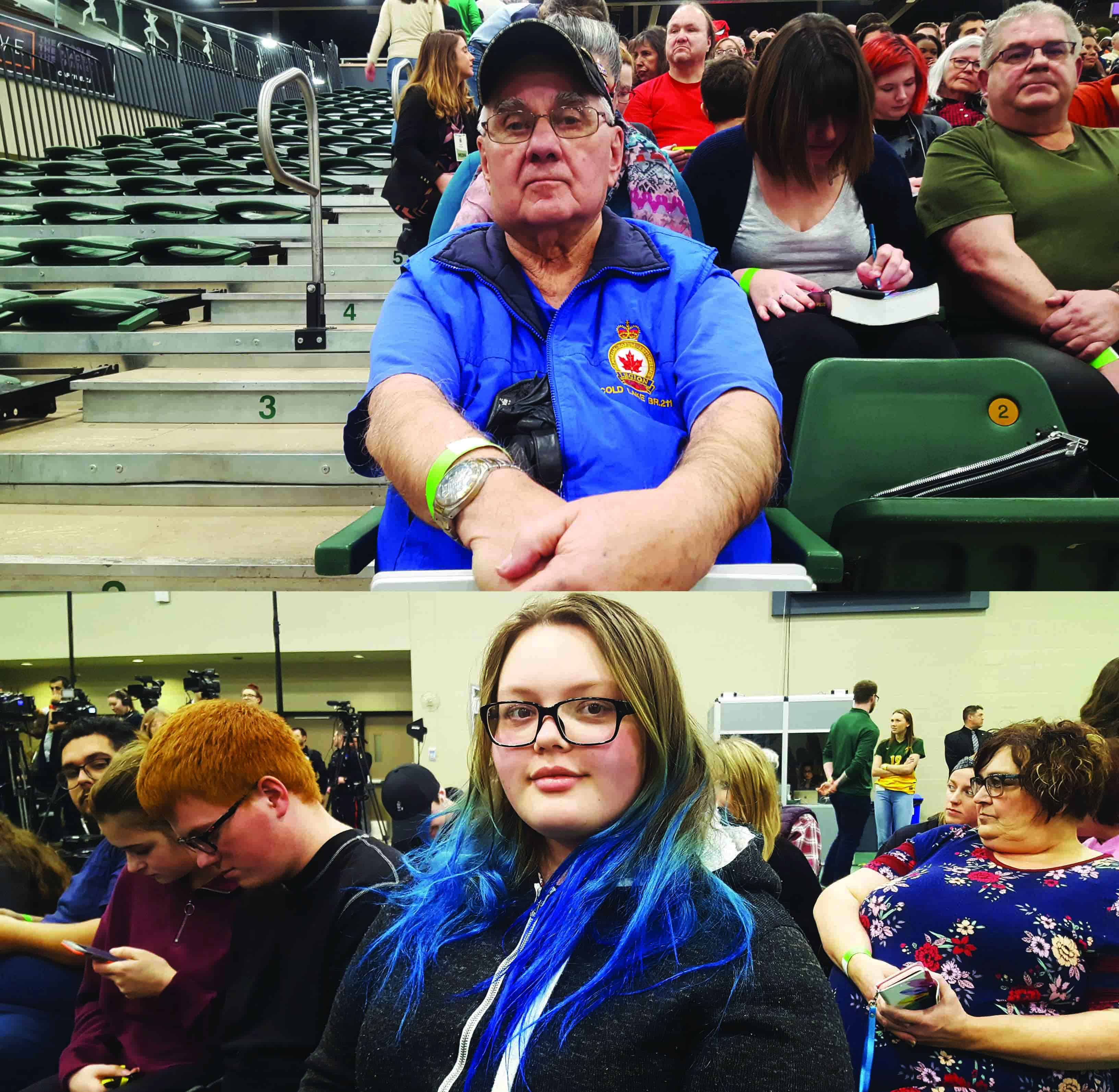Trudeau town hall: The people and the issues

author: Ethan Williams | Contributor & former staff writer

Approximately 1,100 people gathered to listen to Prime Minister Justin Trudeau answer questions at a town hall event on Jan. 10. / Ethan Williams
Canadians share their concerns with the PM
WAITING FOR WORD
Standing in line moments before the doors opened to the town hall, Kiara Schiller held her bright pink sign bearing a simple, direct message: “Don’t tear us apart.”
Schiller, her sister and mother came to Canada in 2011 from Hungary, after her mother entered a relationship with a Canadian man. They are now facing deportation at the end of January when their visitor status expires. The family applied to stay on humanitarian and compassionate grounds, but the federal government denied their request.
“They didn’t put any reasons on the paper, they just told us it was denied,” said Schiller.
What’s most concerning for Schiller is that, if her family is deported, not only will they leave their step-father, but they will also have to leave behind their 4-year-old brother, Jayden, who was born during the family’s time in Canada. Since he has citizenship here, he cannot go with the rest of them to Hungary.
“It hurts my heart,” she said. “My mom’s been a single mother with my two siblings and I, so I’m very, very close with my siblings. I would honestly rather not breathe than to be separated from them. They are my life.”
She said Jayden doesn’t know about the potential separation.
“We can’t break that to him. It would devastate him. He comes and sleeps in my bed sometimes. We’re a very loving family. It would just devastate us seeing him hurt.”
She hoped she would be able to get Trudeau’s attention while at the town hall with her sign and a letter that she had written, requesting he consider their situation. After the rally, she informed the Carillon that some of Trudeau’s staffers had taken the letter and that they said they were already aware of her family’s situation.
There is some good news that has come out of this. The family was informed in the days following the rally that their case would be heard before a court, which means they will be allowed to stay in Canada pending the decision. Schiller says she doesn’t know when the court will rule on her family’s case.
In the meantime, another family member has set up a Go Fund Me page, and a pizza night fundraiser has also been arranged for Friday, January 18. Both will raise money for the family to hire a lawyer, which they can’t currently afford. If the family is forced to leave, the money will go toward helping them resettle in Hungary.
Even though Kiara is holding on to the hope that her family will get to stay together, she wants the government to hear their message.
“Keep my family together. We respect this country and we are a part of the community here.”
MAKING THEIR MESSAGE CLEAR
While hundreds of people lined up to get an opportunity to see Prime Minister Trudeau on Jan. 10, not all of them were there to support his platform.
Protestors organized a truck convoy to protest the carbon tax, open border policies and Bill C-69, which seeks to implement a new impact assessment act for development projects. The convoy encircled the university several times while people gathered inside.
One of the supporters of the convoy, and a so-called yellow vest protestor, Ron Wandler, sympathized with the movement.
“It’s just to show that Canadians, for the most part, are deeply concerned about losing their employment [with] all the regulations that are coming into place to handicap Canadians [and] economic development. Those types of things are big factors.”
Wandler is also concerned Trudeau isn’t working to unite Canadians.
“He’s polarizing the country. Quebec, Western Canada, Ontario, Maritimes. He seems to create a lot of division. He’s polarizing different ethnic groups. First Nations versus the colonialists. Those types of things are very concerning to Canadians and patriots.”
Peter Susa, a former employee of Evraz for 35 years, shared his concerns about aging pipelines.
“I think they’ve [the government] got to be awful careful what they’re doing. Especially with that Kinder Morgan Pipeline. The lifespan of those pipelines is between 40 and 45 years. It was built in 1953. We need those pipelines.”
ASKING FOR ASSISTANCE
U of R Business students Money Mehta and Rupali Rupali were part of the approximately 1,100 people who came out to the town hall to see the PM. Although they admitted they are fond of Trudeau, they had concerns about their education and employment.
“There aren’t any jobs available right now,” said Rupali. “And if they are available, usually people say you need a certificate. But for students who are continuing [their] education there, are no such jobs.”
Both are international students from India. Mehta says those who choose to study at the U of R from abroad are usually out of luck when it comes to looking for work.
“For us, there are very few options, very few areas so that’s why we can’t get a job.”
The two say the UR International has given them help in getting their resumes out, but they have only been hired for minimum wage work that is not within their area of study.
Despite their concerns, they say they still support the PM. Rupali says Trudeau’s trip to India was what made her a fan.
“The way he greeted [people], that was very pleasing for me,” she said. “He’s very down to earth,” Mehta added.









